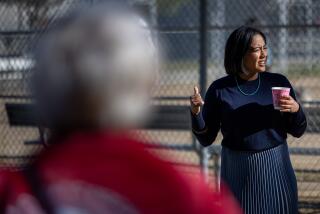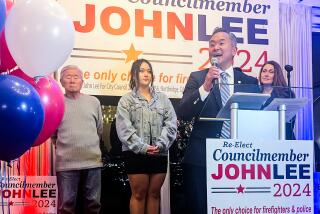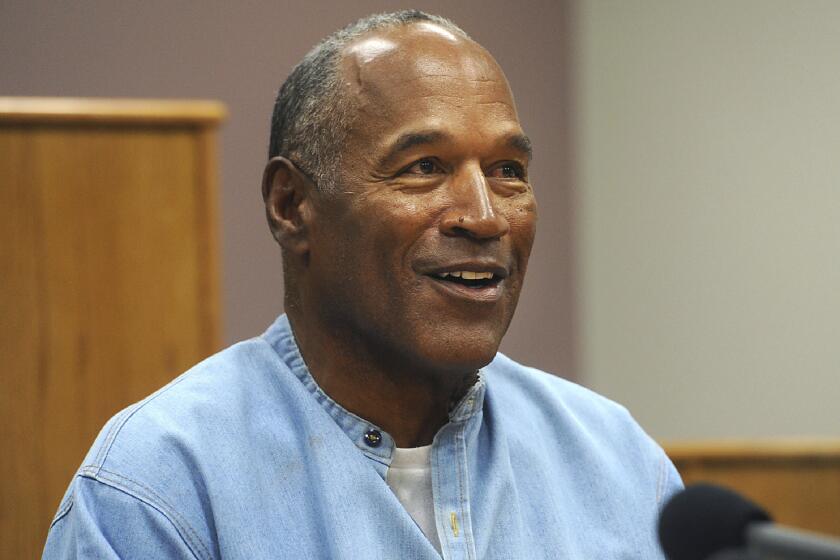Can a Democrat win an L.A. City Council seat long held by Republicans?
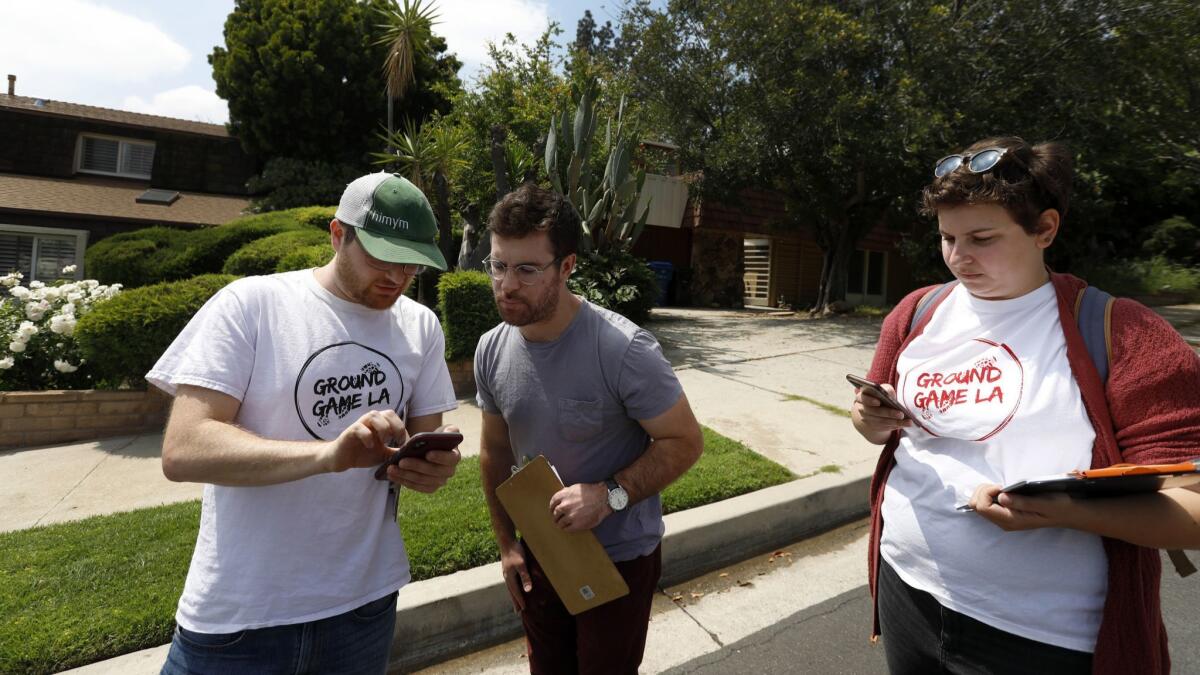
When Ian Carr knocks on doors in neighborhoods like Porter Ranch and West Hills, he is sometimes asked whether his chosen candidate is a Democrat or a Republican.
His answer — Democrat — once got a door slammed in his face.
But Carr, an organizer with the progressive group Ground Game L.A., said that his party affiliation has been irrelevant to most voters and a selling point for others in this northwestern stretch of the San Fernando Valley as he stumps for Los Angeles City Council candidate Loraine Lundquist. At another door, Carr said, an elderly man shouted back approvingly, “She’s got my vote.”
This is known as relatively conservative turf in liberal L.A. For decades, the district has been represented by Republicans on the City Council.
Now, many of the candidates vying to represent Council District 12 are Democrats, including formidable fundraisers such as Scott Abrams, district director to U.S. Rep. Brad Sherman (D-Northridge); nonprofit executive Stella Maloyan; former airport commissioner Jeff Daar; and Jack Kayajian, an administrator in the L.A. city attorney’s office.
With more than a dozen people competing in the June election — and splitting what is expected to be a relatively small number of votes — many Democratic candidates are hopeful that they could snag at least a second-place finish and secure a spot in the August runoff. But whether a Democrat could actually win this Valley seat is an open question.
Some observers are dubious.
“It is a remote possibility. Very remote,” said Larry Levine, a political consultant who is not representing any candidates in the race. Levine said that, based on who has historically been most likely to turn out to vote in the district, “it just doesn’t add up for a Democrat.”
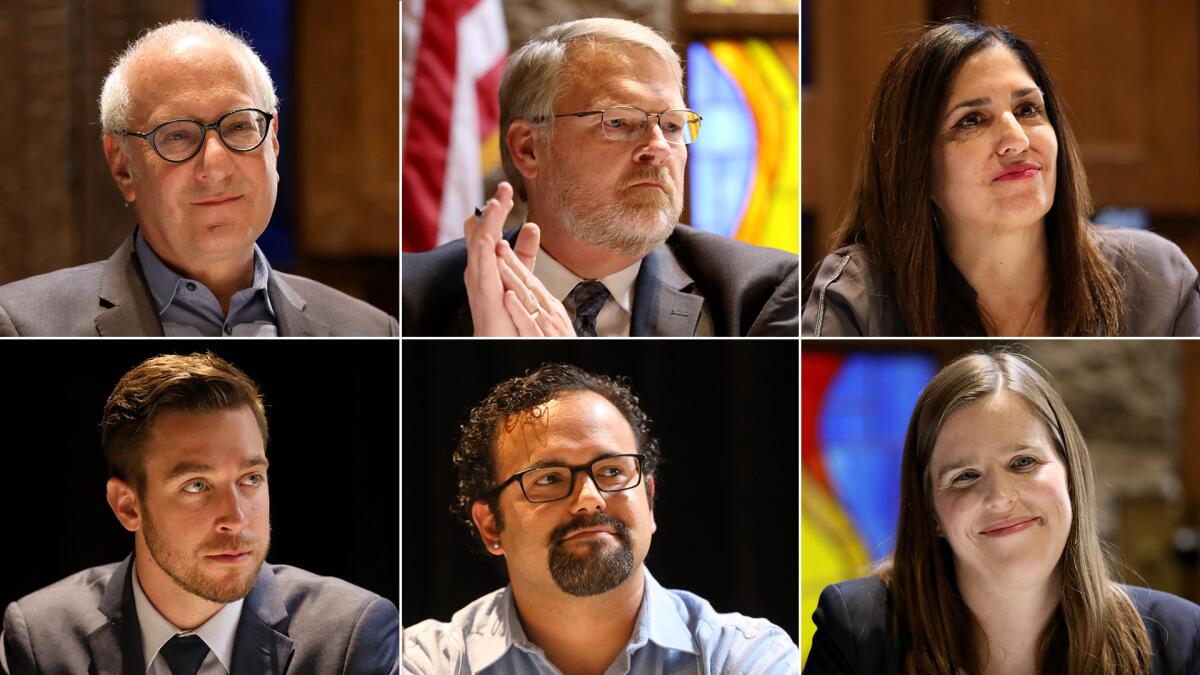
Some issues cut across partisan lines
Yet Democratic candidates, their supporters and some experts argue that there is a path to victory for a Democrat here.
Donald Trump did better here than in any other council district in L.A. — but Hillary Clinton still got twice as many votes as Trump.
In November, Democrats Katie Hill and Christy Smith won U.S. House and state Assembly seats, respectively, flipping Republican-held offices to represent areas that overlap with parts of the council district. Both Democrats were backed by roughly 60% of eligible voters there.
“This whole group of people that volunteered for Katie Hill and were excited about flipping it — people are feeling that energy all over,” Carr said.
The race is officially nonpartisan: No “R” or “D” will be listed next to candidates’ names on the ballot. Many municipal issues, such as real estate development or street repairs, do not break down neatly along partisan lines. And several contenders are running without aligning with a political party.
“When I say I’m independent, they say, ‘Oh, good!’” said one of those candidates, Jay Beeber, who heads the advocacy group Safer Streets L.A. “I don’t think it’s a question of conservative versus liberal. It’s really a question of good government that people are looking for.”
Daar, one of the Democrats in the race, said that with voters focused on “quality-of-life issues” such as homelessness, “it doesn’t seem as if what party I am is that important.”
But candidates have nonetheless been asked at community forums about some politically polarized issues, such as whether they support Medicare for all and recognizing L.A. as a so-called sanctuary city. Some of the residents showing up at those forums fall to the right of any of the Democratic candidates up on stage.
“The left is trying to ram things down our throat,” said Rachael Catran, a North Hills voter who attended a forum at a Porter Ranch school. She complained that California had been choked by high taxes and excessive regulation and become “very communist.”
Democrats hold registration edge
Yet, registered Democrats here outnumber Republicans, whose ranks have thinned.
Republicans have fallen from 37% of registered voters in the district in 2000 to 24% in 2019, according to figures from the county registrar. Democrats remained roughly 44% of registered voters during that same period, while “no party preference” voters have risen.
“People think that District 12 is largely a red district. It is not so. It is a mixed district,” said Democratic candidate Raji Rab, an aviator and educator.
Others believe that partisanship could actually help Democrats in the campaign. Political consultant Mac Zilber, who was working with Democratic candidate Serena Oberstein before she was disqualified in the council race, argued that as the country has become more politically polarized, Democrats are less likely to vote for a Republican in a local race than in the past.
“This is a district that is very likely to elect a Democrat if the election becomes a referendum on partisanship,” Zilber said.
Republican candidate Frank Ferry, who previously held local office in Santa Clarita, said the council district has a number of Democratic voters with conservative viewpoints — “who became Democrats back with John F. Kennedy and don’t want to switch.” Voters routinely ask him his political party, often before they ask anything else, he said — and sometimes they don’t like the answer.
Still, “I wouldn’t be running if the district was not to the right, moderate,” Ferry said. “I’m a realist.”
Voter turnout is also likely to be low in a special election with no national race on the ballot, which traditionally means that the voters who show up will be more conservative.
Democratic candidates have nonetheless argued that, with low turnout and lots of candidates, a Democrat could eke out a spot in the runoff by mobilizing enough supporters.
“It’s about being able to turn people out and also having a lane,” said Rob Quan, campaign manager for Carlos Amador, an immigrant rights advocate running for the seat.
For instance, Quan argued that the Latino population in the district is “something that we’ll be able to tap into better than a lot of other candidates.”
Latinos make up roughly 20% of citizens of voting age in the district, according to data gathered during the last round of redistricting. Asian Americans also make up a sizable chunk of the vote.
“There are more than enough Democrats to win there,” said political consultant Bill Carrick, who is not representing anyone in the race. “It’s just a question of who’s going to show up.”
A Republican front-runner
The front-runner in the race is widely believed to be John Lee, the former chief of staff to the last councilman, Mitchell Englander.
As a former City Council aide, Lee would be taking a well worn path to the seat: Englander was the chief of staff to the previous councilman, Greig Smith, who was the top aide to Councilman Hal Bernson before him.
Englander, who stepped down at the end of last year, was the sole remaining Republican on a council that has routinely taken liberal stands on issues such as immigration and gun control. Lee is also a Republican, but he has not campaigned on starkly conservative issues, instead focusing on his experience in the district.
He could face competition for Republican voters from Ferry and from Brandon Saario, who works in film production and has pointedly campaigned on his conservative politics. Another Republican candidate, however, businessman Navraj Singh, has done little to emphasize his political party in the race, telling The Times that “party affiliation does not matter.”
Democratic candidate Annie Cho, who owns a public relations company, argued that “this office has been held by a Republican so long mainly because it was inherited.”
“This is an opportunity to bring about new leadership,” Cho said.
Twitter: @AlpertReyes
More to Read
Start your day right
Sign up for Essential California for news, features and recommendations from the L.A. Times and beyond in your inbox six days a week.
You may occasionally receive promotional content from the Los Angeles Times.

